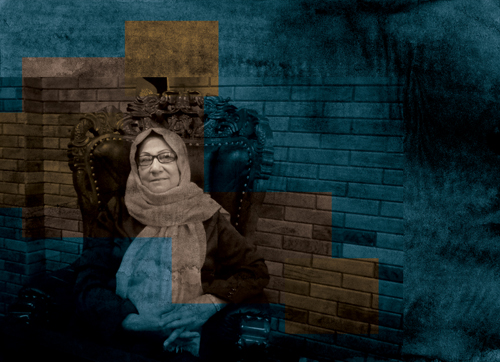Sediqa Balkhi has served two-terms as a Senator on the Meshrano Jirga [Senate]. She was elected Chair of the Women’s Affairs Committee in the last Senate and is currently Chair of the Civil Society and Human Rights Committee. She is also as a member of the High Council of Peace. Balkhi is the daughter of Seyyed Esmaeil Balkhi, one of the most prominent reformist leaders, freedom campaigners, and a renowned poet and philosopher. Her family spent years living in exile in Iran.
Can you share with us some memories of instances when your rights have been violated and how they have influenced your life?
When I was just eighteen months old, my father, Seyyed Esmaeil Balkhi, was imprisoned without trial. He was held in prison for 15 years for defending human rights, freedom of speech, and social justice. Shortly after his release, he was imprisoned again and ultimately poisoned.
I had to marry at a young age because I was the oldest girl in the family and we did not have a close male relative. I continued my studies while I was married and had children. My brother, Seyyed Ali Balkhi, an economics professor, was killed during the Taraki-Amin era [1978-9].
One day, as I was on my way to school, somebody approached me and asked me where I was going. When I told him I was going to school, he tried to slap me, but just as if God had prevented him, he didn’t. He said I would die if I went to school again.
What are the most important achievements since the time of the Taliban in Afghanistan?
The notable achievements include the Constitution, the representation of women in various fields, and the establishment of the three branches of legislative, judicial, and executive power across the country.
What has attracted your trust and confidence in the present system?
At the Bonn I Conference, we agreed that a stable regime should be established in Afghanistan with a Constitution and three branches of power. Furthermore, the extent of the international community’s investment in a stable Afghanistan has allowed us to believe in the reconstruction of the country that is underway.
What is your worst fear today?
I do not have any fears, because I come from a family of activists and resisters. I want us to have an independent, free, and developed Afghanistan with a clear identity.
What are the biggest challenges facing Afghanistan?
There are a number of challenges, including a weak and dependent economy created because the promises of the international community have not been upheld, the lack of proper state planning to build infrastructure and the large scale population exodus to other countries.
Would today’s Afghanistan allow schools to once again be closed to girls and women to be excluded from social participation?
The nation of Afghanistan will never allow it. You can see the enthusiasm for education, even at the lowest layers of society, despite all of our problems and poverty. People are sending their children to school and seeking out knowledge.
Which factors deter women from participating in social, economic, political and cultural spheres?
The reprehensible customs and traditions are the first deterrent factor. Other deterrent factors include the patriarchal system, the lack of confidence in women’s management and leadership capacities, and finally the low level of literacy among women. The discriminatory attitudes of male members of Parliament have a direct impact on the laws which affect the status of women. Because of these attitudes, the mandated quota for women’s representation in the Elections Law was reduced from 25% to 20%. But we members of the Civil Society and Human Rights Committee of the Senate prevented complete omission of the quota system by insisting on its inclusion.
What are the key demands of women?
Women’s economic self-sufficiency, better conditions for women’s growth and development in all areas, in particular with respect to higher education and politics, and access to equal opportunities.
Which social forces can women count on?
The civil society, the Parliament, the Ministry of Women’s Affairs, and the exceptional women we have in our country. Despite our certain and not insignificant shortcomings, these are but a few of the sources of power we can look to.
What have you done in your personal and professional life to fight against obstacles to women’s participation in Afghanistan?
I hold meetings with the civil society, officials of the Ministry of Women’s Affairs, and the judiciary, in particular the female judges, and we work collectively to eradicate violence. I have worked intensively with the media to inform people of women’s issues. I have travelled to other provinces and held meetings with governors, district governors, judges, influential persons and clerics, and discussed women’s status under religion. I asked the clerics to raise these issues with the people during their sermons; to speak about the equality of men and women from a religious point of view, and about human rights and values.
The Law for the Elimination of Violence Against Women has been in the Wolesy Jirga [Lower House of Parliament] for the past four years; it has not been passed and it has not come to the Senate. Laws have to be passed in the lower house first and then come to us. Only then can we discuss them in the Select Committee. Unfortunately, that law has not reached us because of the discriminatory attitudes of men, even though the law is currently in force by presidential decree.
“Unveiling Afghanistan, the Unheard Voices of Progress” is a campaign by Armanshahr and FIDH, which explores views held by Afghan civil society actors. Over 50 days, 50 influential social, political, and cultural actors hope to spark conversation and debate about building a society that is inclusive of women’s and human rights in Afghanistan.
Follow 50 interviews drawn from the “Unveiling Afghanistan campaign” daily on the Huffington Post. Follow Unveiling Afghanistan on FIDH Twitter: www.twitter.com/fidh_en


